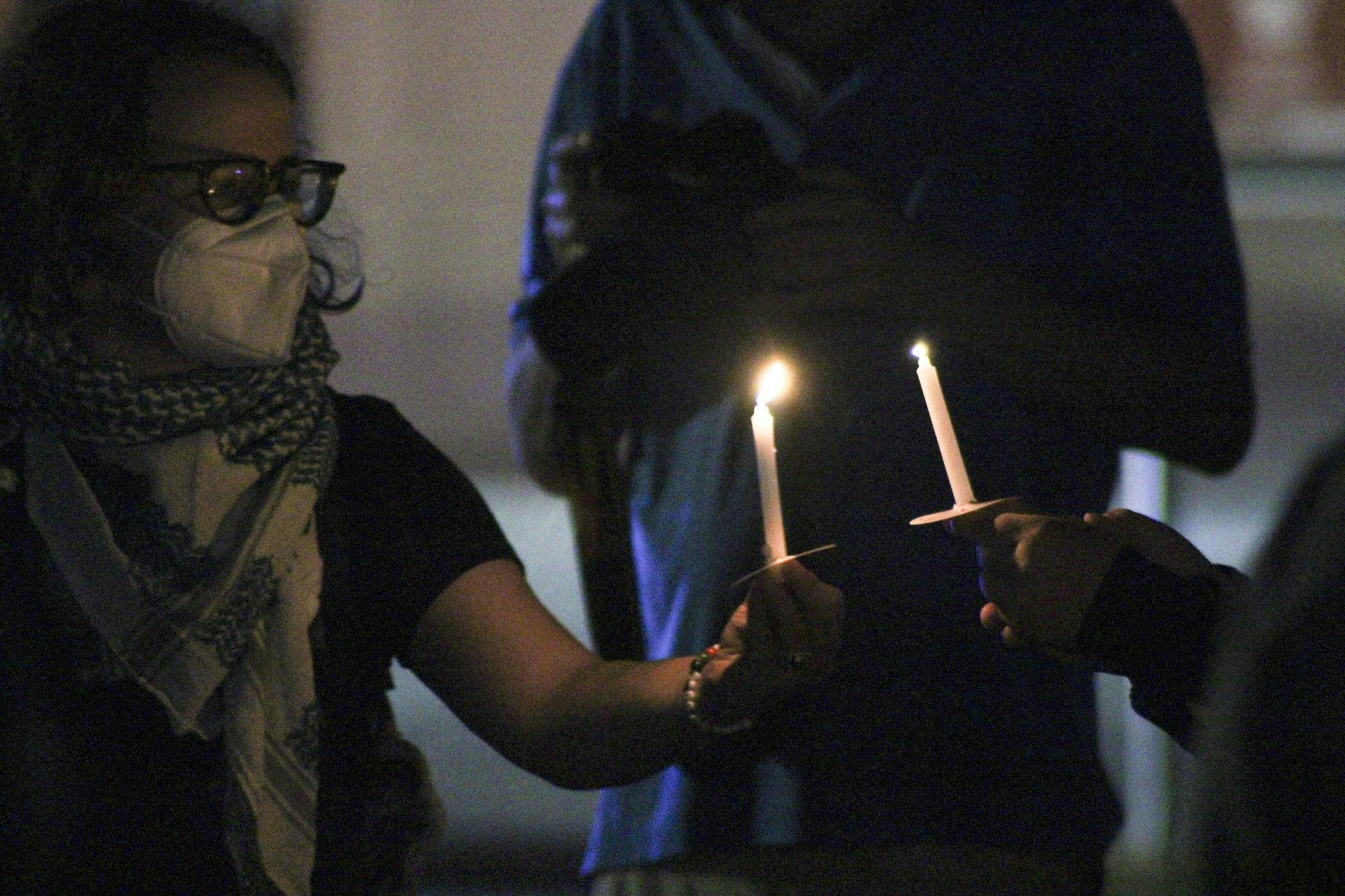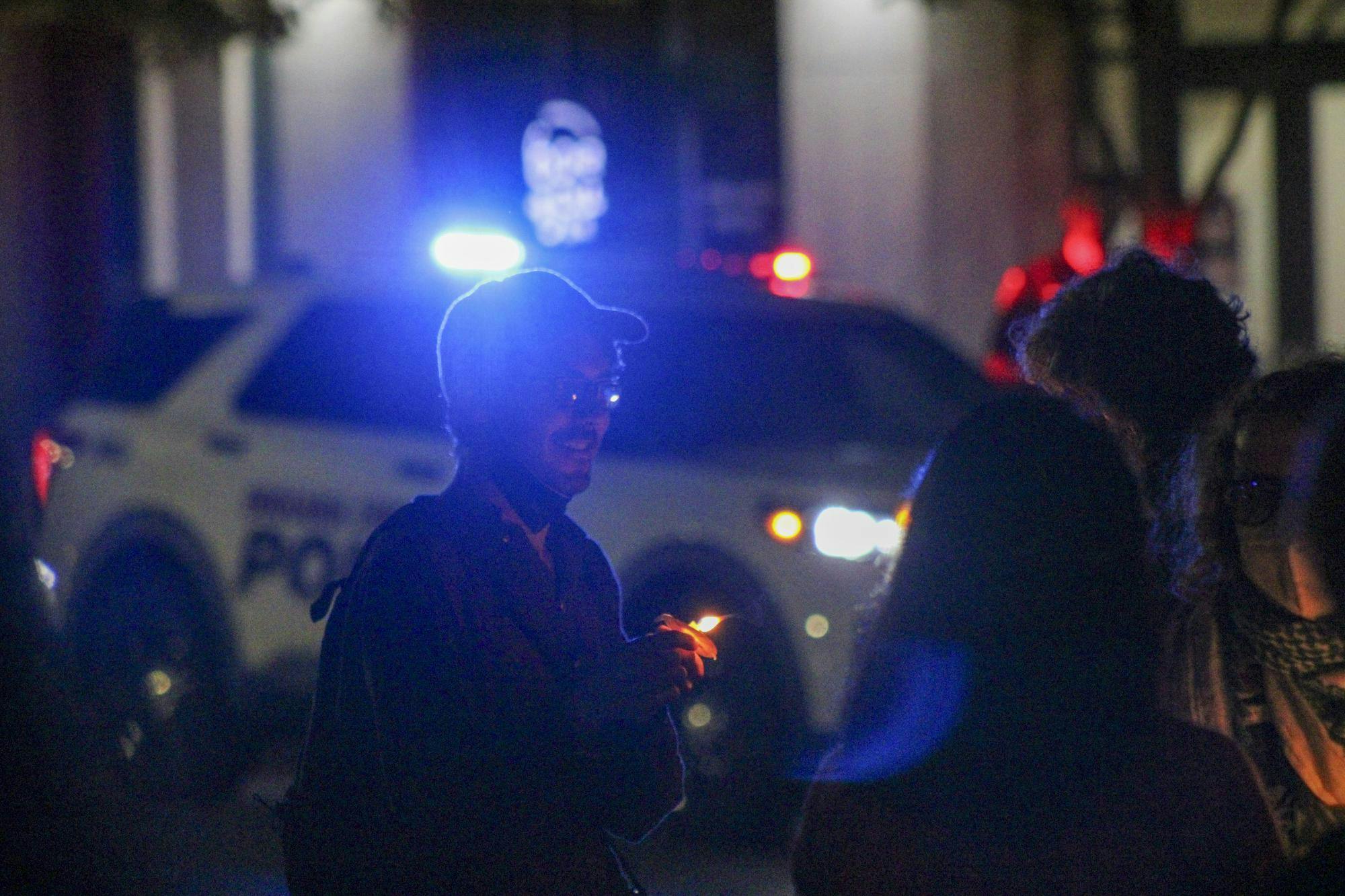Candles and IU Police car lights illuminated Sample Gates late Sunday night as around 40 IU faculty and students gathered for a vigil “mourning the loss of freedom of expression” at IU.
Attendees intentionally violated IU’s new expressive activity policy, which prohibits protesting and peaceful assembly outside the hours of 6 a.m. to 11 p.m. Some wrote chalk messages on the gates and sidewalks in support of free speech and Palestine. Under the policy, water-soluble chalk is only allowed on sidewalks, and non-soluble substances are disallowed on all university property.
Heather Akou, an IU associate professor and program director of fashion design arrested at a pro-Palestinian encampment in April, said the goal of the vigil was to express grief with the policy by breaking what she called its “repressive” restrictions.
“We were able to hold a perfectly safe gathering and express ourselves after 11 p.m., so that’s a victory in itself,” Akou said.
Those at Sample Gates and the two IUPD cars, parked on Indiana Avenue and south of Bryan Hall, did not interact, except for two attendees who offered an officer a candle. That officer left around 20 minutes into the vigil.

Among the attendees at Sunday’s vigil was IU Student Government President Cooper Tinsley. IUSG previously wrote in an Instagram story in July it did not endorse a then-draft of the expressive activity policy, based on student survey results, discussion with student governance groups and a Student Body Congress vote. At the vigil, he referred the Indiana Daily Student to IUSG executive press secretary Alexa Avellaneda.
Avellaneda shared a statement on Tinsley’s behalf which said he attended the vigil as an observer to understand how the campus community is feeling.
"It was also meaningful to see both students and faculty participating, recognizing the shared commitment we all have to the principles of free expression,” the statement read. “IUSG has always been, and will continue to be, a staunch advocate for freedom of expression.”
Ben Robinson, an associate professor of Germanic studies who was also arrested at the Dunn Meadow encampment, said he sees the policy as a reaction to the content of the pro-Palestinian protest.
In July, IU President Pamela Whitten shared the results of a “post-action review” of the events before, during and after the arrests of pro-Palestine protesters April 25 and 27 at the encampment. The report stated IU has a history of inconsistently enforcing its policies.
Robinson said by choosing not to enforce the policy Sunday, IU acknowledged it knows it’s a “repressive” and “overbroad” policy.
“I think it’s really important that we were out here, we told them their policy was wrong, we defied something that was clearly corrupt in terms of basic moral rights, and they did nothing,” Robinson said.

SEA 202 demands
The University Alliance for Racial Justice, an advocacy group made up of faculty, held a press conference Monday at the Rose Well House to lay out its “Protect IU from 202” demands of the university. IU faculty, staff and students spoke, expressing their concerns about Senate Enrolled Act 202's impact on the university.
SEA 202 increases state government oversight on “intellectual diversity,” diversity, equity and inclusion initiatives and tenure requirements at public universities.
Many faculty and students condemned the bill’s changes to tenure as an attack on academic freedom. Whitten told Indiana Public Media in February that IU was “deeply concerned about language regarding faculty tenure that would put academic freedom at risk.”
In response to IU’s “initial guidance on teaching and the complaint process” under SEA 202, the University Alliance for Racial Justice released a critical brief Aug. 12 outlining many of these concerns.
IU professor emeritus and University Alliance for Racial Justice co-founder Russ Skiba said a SEA 202 provision requiring universities to compile and share information about DEI initiatives and employees could make it easier for the state legislature to tell institutions to close them in the future. Anti-DEI legislation in other states has led some universities, including the Universities of Florida and Texas at Austin, to close or defund their DEI offices.
The group shared six demands Monday: protect shared governance, protect diversity, protect due process, protect academic freedom, protect students and staff and protect the future.
This includes allowing appropriate time to solicit input from all Bloomington Faculty Council elected representatives, not just leadership, in the policy-making process; disallowing complaints about DEI research or teaching in the SEA 202 complaint process; protecting tenure and academic freedom; and promising not to terminate DEI staff or programs.
In response to an IDS inquiry on the demands, Mark Bode, IU executive director of media relations, referred to a slide deck and frequently asked questions page on complying with SEA 202.
Skiba said Sunday that protection won’t be obtained by “clamping down” on rules.
“When the principles and values upon which this institution has stood for 200 years are under attack, as they are right now, it’s the job of the citizens of that community to protect IU,” Skiba said.
Related IU offers guidance on SEA 202 after 'intellectual diversity’ law takes effect The fall semester begins Aug. 26.




